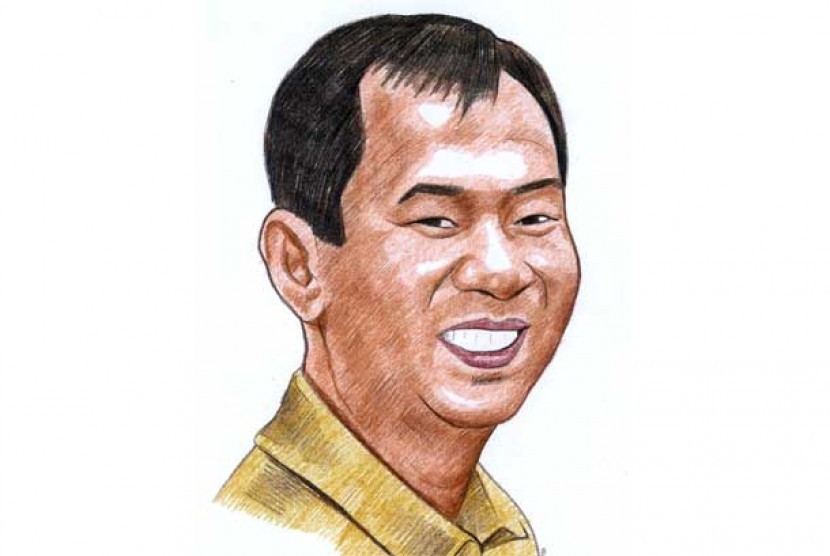REPUBLIKA.CO.ID, By Nasihin Masha
Almost, Jokowi has no rival. His electability level surpasses its competitors. The nearest is only Prabowo Subianto, with a considerable distance. Is this a sign of contestation has been ascertainly end up here? Or will the seven months before presidential election bring a surprise?
Before answering these questions, there are a number of things that must be understood together. First, until now, there was no confirmation whether Jokowi will be nominated by the party, PDIP. The party is still holding on congressional decision that the particulars of a candidate are determined by Megawati, the Chairperson. Though, certainly Megawati still has a desire to move forward again. The concerns over Jokowi's un-nomination was indicated by the birth PDIP Pro Jokowi. PDIP's vote predicted not far from 20 per cent in the next legislative election. That is a minimum figure for a party or coalition of parties to file a presidential and vice pres. candidate.
Second, the Gerindra vote predicted relatively far from the 20 percent in the legislative elections. Therefore, Prabowo requires extra efforts to get support from other parties to form a coalition. If he fails to garner the support, Prabowo cannot be a candidate. For that he continued his guerrilla to garner support. Of whom he had met were Hatta Rajasa, Chairman of the PAN, and Susilo Bambang Yudhoyono, the Chairman of the PD. He was also diligent in communicating with a number of leaders of other parties, including the PDI-P.
It would be very interesting if the two favored public figures then do not get tickets in contestation. Other figures will be born. The names that are under them will pop up, among them, Megawati, Bakrie, Hatta Rajasa, Dahlan Iskan, Mahfud MD, Jusuf Kalla, and so on. If that happens, a new candidate will emerge. Proponents of Jokowi and Prabowo will be disappointed, some will survive to follow the motion of the party, and others will move wildly following their own logic. The figures that follow PD convention will have opportunities, including Anies Baswedan. The name of Chairul Tanjung, a businessman, also can participate.
Uncertainly, the situation is somewhat similar to the situation before the 2004 election. In 2003, Megawati's name was flown alone. As an incumbent she had a lot of advantages. Other names appeared; M Amien Rais. But then, the numbers of swing voters were still relatively large. On the other hand, support to Megawati also not convincing. Then the incident emerged. There was heat friction between Susilo Bambang Yudhoyono with Taufiq Kiemas, which floats in the mass media. SBY finally out of the cabinet, and the support emerged for him. In a short time, the President won the competition. Indeed, that time the rules of nomination were still easy, requiring only three percent of the vote. SBY was so easy to grab a ticket. It should be remembered that before the incident, SBY's support still below five percent, very small. In addition to the friction factor, Megawati burdened with deteriorating legitimacy due to her policy to sell IBRA's assets to foreigners, especially Indosat.
Currently, the candidates are not dealing with incumbent or a candidate supported by the ruling party. Even the two names, Jokowi and Prabowo, come from the opposition party. There is excitement to correct public policy or seek a different atmosphere from the color of the current ruler. These two figures represent the antithesis of SBY. Jokowi is a rustic figures, common people, not handsome, simple, informal, and so on. This contrasts with SBY; handsome, elegant, charming, and formalistic. While Prabowo represent nationalistic thinking, assertive, and pro-people - at least as his speech.
This is in contrast with the image of SBY who over consider the interests of the world and foreign investors, closer to the elite, and too cautious in decision making.
All of this indirectly answers the two questions at the beginning. The 2014 presidential election is not as simple as one might imagine, especially over the spread of electability numbers of various polls. The numbers are not fully pro Jokowi. Still, there is a possible rise of surprises. First, if the Court annulled the candidacy requirement of 20 per cent to three per cent. Secondly, if there is a mistake of Jokowi as governor and his supporters. The fanatical supporter's attitude as shown in the world of social media and the birth of Pro Jokowi movement has a weak point of its own. Third, if a figure exists that could encapsulate all the expectations of the voters.
The Jokowi 'voters' are people who are bored with the 'polish' and 'imaging' character. They want authenticity and humility. Still, the popularity of SBY shows that most of the Indonesian public requires leaders who can boast pride. The greatness of Bung Karno or Pak Harto was among them, because the two presidents were handsome, neat, and charming. Fourth, the public also requires a change in content that can represent the greatness of Indonesia. Not a soft and submissive figure. Prabowo, who has a handicap in the past, was accepted because he carries this message. This expectation is also reflected in the high popularity of Dahlan Iskan and Jusuf Kalla. Still, the popularity of the President also shows that the public wants harmony, order, and decency.
On the other hand, the public is still easily swept away by advertising and traditional loyalty. The color of pragmatism is a reality that remains in any society.
People are more intelligent and more able to express what they want. Thing that has not changed is the leader. They were not quite able to capture the signal shown by their people. People are not waiting for Messiah, but were waiting for a leader who can capture their energy.
Choosing the true leader is choosing the people. Indeed, it's the people who come to the voting booth. But the people will cast their leaders who can gather the people in the same vision and dream. That is the authenticity of elections.


